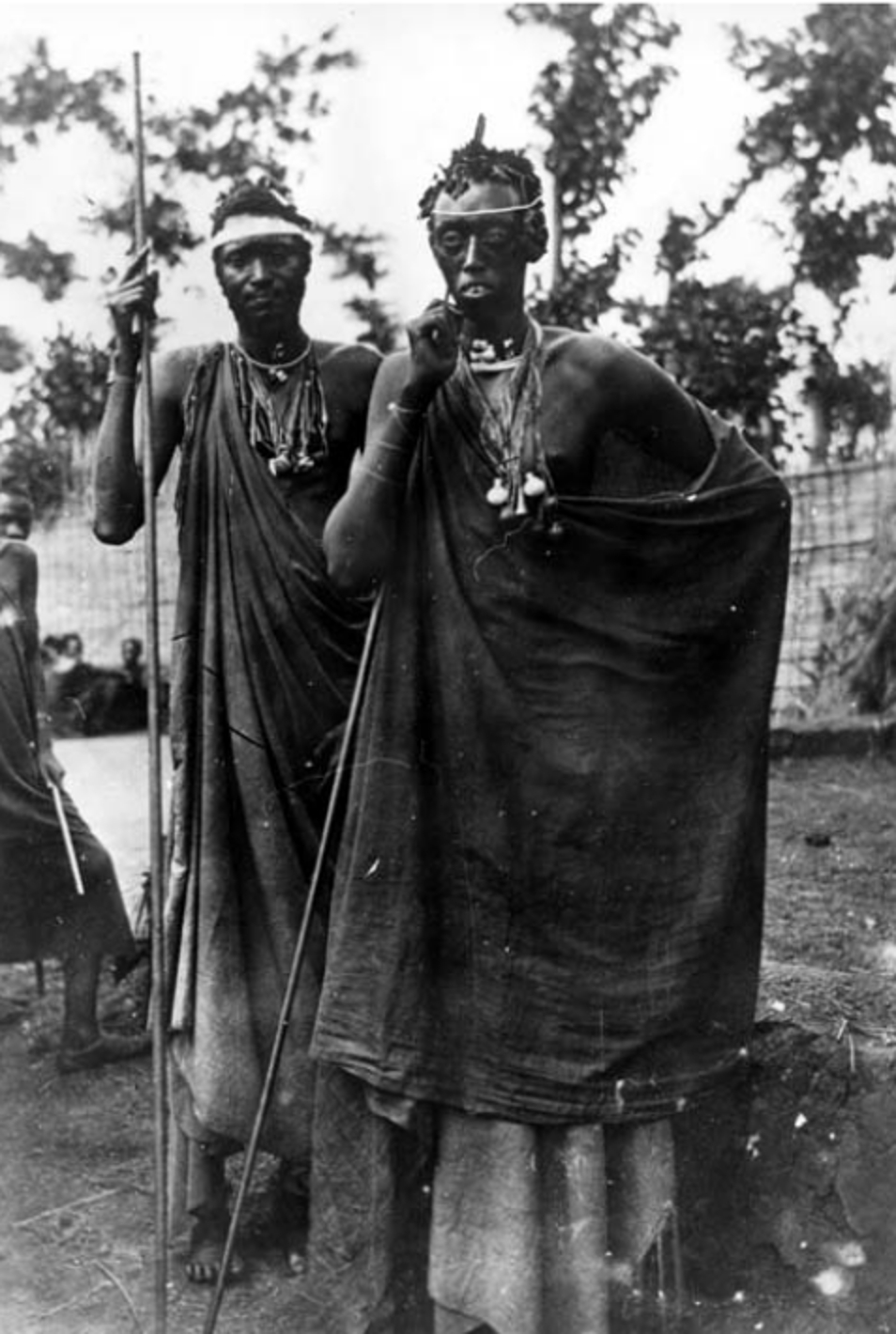Meet Paul Kagame's Great-Grandfather!
 |
| Kabare (left) and Musinga (right) |
This
photograph portrays two men, who played a very important role in the
history of Rwanda in the 20th century. On the right side, you see
Musinga, the king of Rwanda from 1896 to 1930. The other man is
Kabare, his uncle. The picture was taken around 1910. Musinga came to
power by a coup in 1896, when he was twelve or thirteen. The coup
became known in history as the coup of Rucunshu. The driving force
behind the coup was Kabare and his sister Kanjongera. Kanjongera was
the favorite wife of the former King Rwabugiri, who died in 1895. As
the new king's mother, Kanjongera had an enourmous influence on the
court's politics. Rwabugiri had chosen his elder son Rutarindwa as
the heir of his throne. Kanjongera and Kabare, however, belonged to
the powerful Bega clan, while Rutarindwa belonged to the Bakono clan.
After a disastrous defeat of the Rwandan army against Belgian troops
at Shangi in 1895, Rutarindwa came under pressure from various
factions of the court and lost some of his most powerful supporters.
Kabare and Kanjongera took the chance and attacked the isolated king
at his residence in Rucunshu. Their followers killed most of the
relatives and followers of Rutarindwa. The king himself committed
suicide.
This
was the beginning of the rule of the Bega clan, which lasted for most
of the first half of the 20th century. Notably in the first decade of
Musinga's rule, Kabare dominated the politics of the Rwandan court.
This was a period when the rulers of Rwanda faced many challenges.
The legitimacy of the new king was contested by many Rwandans. In the
following years, some major rebellions occurred against the Bega
rule. The arrival of Germans and Belgians in the region was another
challenge. Musinga opted for a cooperation with the Germans to help
him to get rid of the internal opposition and the threat by the
Belgians. With the help of the Germans, Musinga secured the power of
the Bega clan and the survival of his kingdom. It was only dissolved
in 1962.
Nearly
a hundred years later, a great-grandson of Kabare, Paul Kagame came
to power by an armed rebellion against the government of Juvénal
Habyarimana. During the last two decades, the replay of monarchical
traditions played some role in Rwandan politics.

Would you have a full genealogy from Kabare to Kagame, with indication of the clan of these persons? Thank you.
ReplyDeleteThanks for sending the information by email: filip.reyntjens@uantwerp.be
ReplyDeleteKagame is the son of Rutagambwa son of Kampayana son of Cyigenza son of the patriarchal RWAKAGARA: The ancestor of the BAKAGARA a branch of the began clan. In our region when a mwami was enthroned he literally ownend everything including other people's children and wives. Rutalindwa was not a mukono, his mother was. He was munyiginya like Musinga.He was not the legitime son of Rwabugiri but was taken when the king took his mother from his real father Gacinya and all his children.
ReplyDeleteKampayana was Kabare's brother.
ReplyDeletethank you
DeleteNo, Kabare was not Kampayana's brother, but Cyigenza's the father of Kampayana.
DeleteActually Kabare was the brother of Cyigenza (the actual great grand father of Kagame). But yes Kagame come from a powerful noble lineage which arose to power at the end of the 19th Century.
ReplyDeleteHi I’m a descendant of Rutalindwa, you tell me his real family line
ReplyDeleteHi I’m a descendant of Rutalindwa, you tell me his real family line
ReplyDeleteRutarindwa was the son of Gacinya ka Rwabika a Munyiginya nobleman who was a chief in the Gisaka region. Rutarindwa, and several of his brothers, was adapted by Rwabugiri after marrying his mother and her sister at the same time. The two sisters were already married when their aunt, Murorinkwere, Rwabugiri's mother, took them from their husbands and gave them to Rwabugiri. This forced marriage ended with Rwabugiri murdering the two women when they meddled in political affairs. By the time Rutarindwa became Umwami he was motherless.
Deleteam niece of Emmanuel Fred RWIGEMA kindly help me to know my bloodline thx be bless
ReplyDeleteThank You and I have a neat proposal: How Much Home Renovation Can I Afford cost for second story addition
ReplyDelete